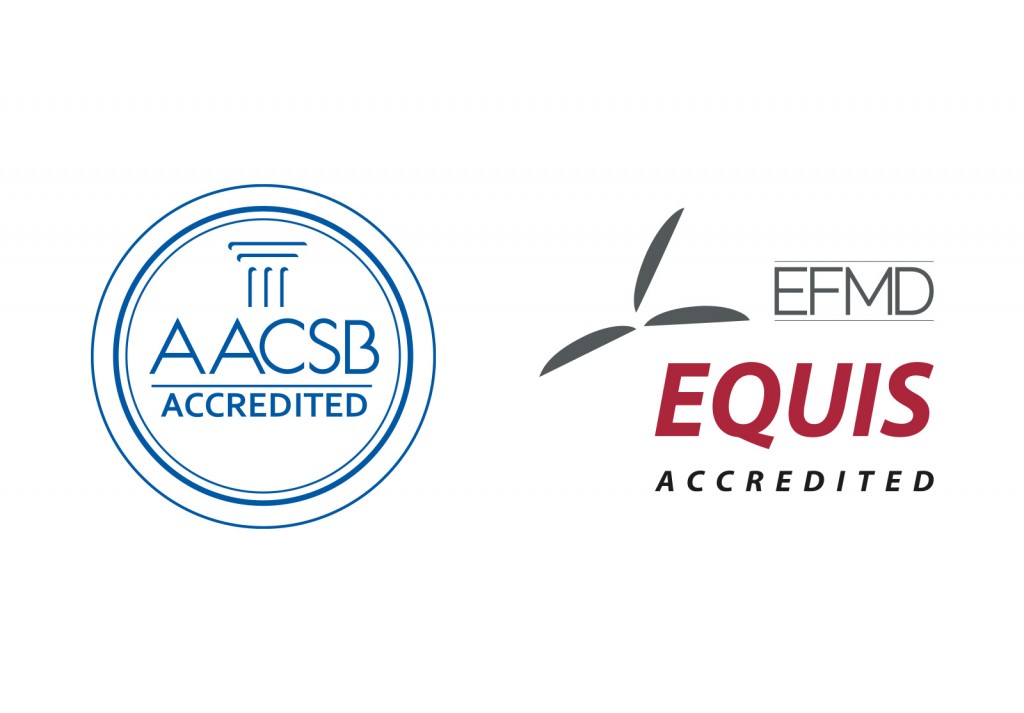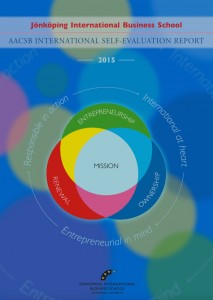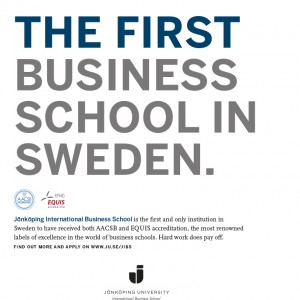JIBS Sets a Record for Sweden
Once in a while, we must forget our Swedish modesty and take the streets (and the Internet) to boast loudly and publically about ourselves, especially when it demonstrates a hard-won achievement that we all can be proud of!

In this case, it’s the fact Jönköping International Business School (JIBS) has become the first and only business school in Sweden to achieve the distinction of being “double accredited.” In 2015, JIBS received both the EQUIS and AACSB accreditations, an amazing feat, given that these two accreditations are both extremely difficult to earn and that we won them both in the very short period of time of a year.
Every morning an estimated 300 million people study business and management, and this brand of higher education represents the largest student numbers worldwide so business schools need to distinguish themselves. Being a double-accredited school is immensely vital to a bright future for JIBS. It helps us attract the highest quality faculty and retain those who are already teaching and researching for us. It attracts the top students from around the world to apply here so they can attend a “leading global business school” and proudly put it on their CV. It allows JIBS to create invaluable new relationships with companies and organizations that can benefit our faculty and students, and it offers us new opportunities for partnerships with other top business schools in the world. In short, it elevates JIBS to a lofty position among business schools. Out of some 13.000 business schools in the world, a mere 100 or so can put the quality hallmark of both AACSB and EQUIS logotypes next to their own.
We did it! And there is so much to be proud of that we want to be sure everyone clearly understands what each accreditation says about JIBS and what we gain by having earned it. The two accreditations are very different in what they measure, so that collectively, earning them both means that JIBS has met a wide variety of quality standards by which business schools are judged.
The Rarefied Club of EQUIS
Imagine being invited to the one of the most exclusive clubs in the world, but before you can go, you have to petition and prove you deserve to be scrutinized to even apply and that only one-quarter pass through this initial loophole. Having passed that hurdle, the journey to be among the group who are already in it has just begun.
Well, that’s what we had to go through to earn the EQUIS accreditation from European Institute for Management Development (EFMD), an international organization based on Brussels consisting of 800 organizations from academia, business, public service and consultancies in over 81 countries. EFMD’s EQUIS accreditation seeks to set standards of quality in management education worldwide—and to date only about 160 schools in the world have earned it. Financial Times business education editor calls EQUIS the “gold standard” for business schools.
The EQUIS accreditation examines the entire institution, assessing not just all its degree programs, but also its research capabilities, faculty teaching, student quality and diversity, administrative prowess, and financial soundness. It has three broad probes into a school: (i) the extent to which the school demonstrates internationalization in its ability to attract global students, in its alliances with other schools and corporations, and in its teaching programs; (ii) the quantity and quality of corporate relations that the school maintains and (iii) the philosophy and proven track record that the school has in regard to instilling Ethics, Sustainability and Responsibility in its culture and teaching.
To apply for EQUIS, a school must write an extensive self-assessment report documenting its current status and efforts at improvement in the following 10 areas.
- Context, Governance and Strategy
- Programmes
- Students
- Faculty
- Research and Development
- Executive Education
- Resources and Administration
- Internationalization
- Ethics, Responsibility and Sustainability
- Corporate Connections
The last three areas represent necessary, but not sufficient overall conditions to win EQUIS accreditations. Unless schools are really international, have great corporate connections and take ethics, responsibility and sustainability seriously, they shouldn’t even bother to apply.
Preparing this self-assessment report was no minor feat, as it involved at one time or another nearly every JIBS faculty member, the Director of Quality & Accreditation, the entire Leadership Team, and even a small cadre of JIBS students. Following submission of the report, three EQUIS evaluators – experienced leaders of business schools and business – spent three days on the JIBS campus, poking around, prodding, and interviewing people to confirm the self-assessment. EQUIS assigns the review task to leaders of already accredited schools and corporate members who perform the work on a voluntary basis. In our case the evaluators came from Canada, France, Turkey and Sweden.
Three weeks after I took office in January 2012, I sounded out EFMD officials regarding the possibility of JIBS entering the EQUIS process, but at that time we were not ready. However, 18 month later we had renewed JIBS’ strategy, improved our organization and leadership structure and transformed the way we worked. This made us ready!
The actual work of compiling information for the self-assessment report began in early 2014 and was completed by September 2014. The EQUIS team site visit occurred in October 2014 and EQUIS announced that JIBS had been accredited in March 2015. If you want to know more about EQUIS, see https://www.efmd.org/index.php/accreditation-main/equis.
The Strict Scrutiny of AACSB
While EQUIS is applying for membership in an exclusive club of cohorts, The Association to Advance Collegiate Schools of Business (AACSB) accreditation process is more like taking a test to be sure you are following specific quality standards and if not, how you intend to improve. The accreditation process focuses on three broad areas of quality: (i) Innovation, (ii) Engagement and (iii) Impact, which are detailed out and measured according to strict compliance with 15 standards:
- Standard 1: Mission, Impact, and Innovation
- Standard 2: Intellectual Contributions and Alignment with Mission
- Standard 3: Financial Strategies and Allocation of Resources
- Standard 4: Student Admissions, Progress, and Career Development
- Standard 5: Faculty Sufficiency and Deployment
- Standard 6: Faculty Management and Support
- Standard 7: Professional Staff Sufficiency and Deployment
- Standard 8: Curricula Management and Assurance of Learning
- Standard 9: Curriculum Content
- Standard 10: Student Faculty Interactions
- Standard 11: Degree Program Educational Level, Structure, and Equivalence
- Standard 12: Teaching Effectiveness
- Standard 13: Student Academic and Professional Engagement
- Standard 14: Executive Education
- Standard 15: Faculty Qualifications and Engagement
Like EQUIS, JIBS had to file a lengthy self-assessment report that we began compiling in early 2015. The 100+ page report was completed in June 2015 and the ACCSB team of peer-reviewers came to campus in November. This time the group included seasoned business school deans from the US, UK and Canada who also contribute their time on a voluntary basis. We received our much sought after accreditation on Dec 18, 2015. This now brings the total number of schools who have earned AACSB to 746 institutions. Although some 500 US schools dominate, AACSB have recognized institutions across 51 countries or territories. If you want more information about AACSB, see http://www.aacsb.edu/accreditation/promotion External link, opens in new window.
.
What’s next for JIBS?
JIBS is now among some 100 “double” EQUIS-AACSB accredited business schools worldwide. What’s next? The answer is open to the highest goals you want to achieve for this former underdog and now already a shining star among Scandinavian business schools. In Scandinavia, only Copenhagen Business School and Norwegian School of Management have achieved this double EQUIS-AACSB status. In this important respect, JIBS is now the “FIRST” business school in Sweden.
After completing my four-years tenure, I am about to leave my post as CEO & Dean of JIBS and my role will be taken over immediately by professor Mattias Nordqvist until a permanent new Dean has been recruited. I will be indirectly involved in the background in the next phase since I will now be a professor on leave but keeping a foot in PhD supervision and research.
I am tremendously grateful to all those who have helped me take JIBS on this journey through fields of immense challenge and change, especially during a time our parent university went through a radical reform of its basic philosophy and governance model. Not only have we garnered these two accreditations, a testament to the quality of the entire JIBS system of international business education, but we have accomplished a great deal both inside and outside JIBS:
- Renewed the JIBS strategy including a refocused unique mission, three guiding principles, and a set of action-oriented rolling three-year strategic priorities
- Rejuvenated the educational portfolio by eliminating one program and developing three new ones, including a new Masters with our sister school in Engineering Management.
- Modernized our organization from being organized around traditional academic departments to being based around natural research groups that help boost multi-disciplinary research and teaching
- Collapsed one management level and reduced the leadership into a small team of colleagues who are tasked with thinking holistically about JIBS and its future
- Secured EPAS re-accreditations of two programs
- Became signatories to the UN PRME goals and submitted our first two-year report, which won an award in 2015
- Further developed a partnership in Ethiopia into a major and unique multi-lateral collaboration in PhD education, research, and private sector development also in Rwanda, Uganda and Tanzania (see 2015 article in AACSB BizEd magazine)
- Launched a five-year externally funded research project to improve the “footprint” of JIBS faculty in the broader society, including the Vertikals blogging site and the highly successful “250 Possibilities” (250 Möjligheter) annual conference on the urban-rural challenge in Sweden
- Radically improved the financial situation so that JIBS is debt-free and has a healthy surplus as well as reserves for investments
I guarantee you that the world of business schools will continue to need change. Continued globalization as well as technological developments, new competition and changing ways of the Millennial generation calls for continues change. Unfortunately, we must also be prepared for the emerging risks of reduced mobility because of political and social conflicts, and Deans and faculty must pay attention to these issues.
No matter how far we’ve come in these four years, the hurdles ahead will be even greater. Doing the same thing is not a good strategy. There will be more pressure from corporations that we must graduate a new breed of business students with greater leadership skills, global thinking, and a commitment to socially responsible business behavior. New players will challenge traditional academic institutions in creating value in the eyes of our many stakeholders. I have written and published several articles about new ideas that I believe business schools must begin adopting – such as integrating more humanities into business education (https://hbr.org/2014/07/the-renaissance-we-need-in-business-education/ External link, opens in new window.
);
and building STEM courses into business education so that our graduates can deal knowledgeably with the world of science and technology that increasingly dominates business (http://globalfocusmagazine.com/bringing-business-schools-into-the-stem-era/ External link, opens in new window.).
And my thoughts are just a few among the thousands that other Deans and academic experts have proposed.As proud as we are of our two accreditations, we cannot rest of those laurels for more than the time it took you to read this. Change is good…and I urge everyone to continue to strive to make JIBS even better. So let’s celebrate a moment, pop open a bottle of champagne, and then get back to work.
Detta är en bloggtext. Det är skribenten som står för åsikterna som förs fram i texten, inte Jönköping University.








